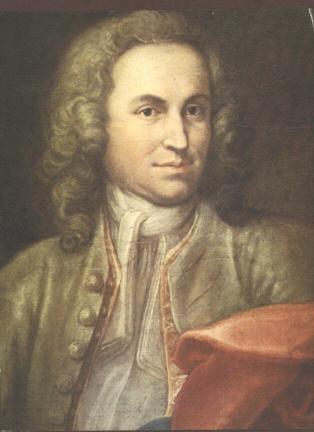|
WEIMAR (second term): 1708-1717
Weimar was quite a small town with only 5000 inhabitants; yet Bach was to meet some very cultured people here. Not least was his employer, the Duke of Sachsen-Weimar, one of the most distinguished and cultured nobles of his time.
Bach's two-fold position as member of the chamber orchestra and as organist to the Court offered him many opportunities for improvement.
The Court Orchestra consisted of about 22 players: a compact string ensemble, a bassoon player, 6 or 7 trumpeters and a timpanist. Bach's function in the orchestra was mainly as a violinist, however he also played the harpsichord and occasionally wrote or arranged some of the music. As was the custom in most 18th Century Courts, the musicians also spent some of their time employed in other household duties about the Court.
In 1714 Bach became the leader of the orchestra, and was now second only to the old and frail Capellmeister Johann Samuel Drese, whose duties he was gradually taking over.
As Court organist, Bach had succeeded Johann Effler, a musician of some standing. The organ was new and not quite as large as the one at Arnstadt. After a few years, Bach declared that it was inadequate and should be rebuilt. It was in fact rebuilt at great expense according to his plans: proof of the high regard the Court had for his capabilities as organist and expert on organ construction.
During this period he wrote profusely for the organ, and he was rapidly becoming known throughout the country as one of the greatest German organists. Organ pupils came to him from far and wide, and he was asked to test or dedicate many organs in various towns. His tests were extremely thorough and critical. He used to say for fun 'Above all I must know whether the organ has a good lung', and, pulling out all the stops he produced the largest sound possible, often making the organ builders go pale with fright. He would usually complete his trial by improvising a prelude and fugue: the prelude to test the organ's power, the fugue to test its clarity for counterpoint. Constantin Bellermann describes his playing (during a visit to Kassel) in these words; 'His feet seemed to fly across the pedals as if they were winged, and mighty sounds filled the church'. Mizler's 'Nekrolog' states: 'His fingers were all of equal strength, all equally able to play with the finest precision. He had invented so comfortable a fingering that he could master the most difficult parts with perfect ease (using 5 fingers instead of the then normal 3). He was able to accomplish passages on the pedals with his feet which would have given trouble to the fingers of many a clever player on the keyboard'.
On a visit to Halle in 1713, during which he gave a trial cantata (probably BWV 21), he was invited to become organist in succession to Zachau, a composer well-known, and celebrated as Handel's early teacher. However, the conditions and salary were not sufficient for his growing family, so he was obliged to refuse the post.
On a visit to Dresden, Bach was invited to compete in a contest with the visiting French organist, Louis Marchand, considered to be one of the best in Europe. But, on the day appointed for the contest, Marchand decided to withdraw discreetly by taking the fastest coach available back to France. And so Bach gave an impressive solo performance before the assembled audience and referees, establishing himself as the finest organist of the day.
Bach made some very good friends at Weimar, among whom was the eminent philologist and scholar Johann Matthias Gesner, who expressed with great eloquence his admiration for the composer's genius. Bach was also a frequent visitor to the nearby 'Rote Schloß', the home of the former Duke's widow and her two music-loving sons. Here the interest was in the new Italian style of music which was then becoming the rage of Europe, one of the chief exponents being the Venetian composer Vivaldi. Bach and his cousin Johann Georg Walther transcribed some of the Italian instrumental concertos for keyboard instruments.
During 1717 a feud broke out between the Duke of Weimar at the 'Wilhelmsburg' household and his nephew Ernst August at the 'Rote Schloß'. Consequently musicians of the first household were forbidden to fraternize with those of the second. Bach did his best to ignore what was, after all, merely an extension of a private quarrel. But the atmosphere was no longer so pleasant. Added to this, the ancient Capellmeister then died, and Bach was passed over for the post in favor of the late Capellmeister's mediocre son. At this, Bach was bitterly disappointed, for he had lately been doing most of the Capellmeister's work, and had confidently expected to be given the post.
Through the help of Duke Ernst August, Bach was introduced to the Court of Anhalt-Cöthen, and as a result he was offered the post of Capellmeister, which he accepted. This infuriated the Duke of Weimar, so that when Bach put in a polite request for his release, he was arrested and put in the local jail. However, after a month, he was released and given reluctant permission to resign his office. During this enforced rest, Bach typically used his time wisely - that is musically - and prepared a cycle of organ chorale preludes for a whole year, published later as the 'Orgelbüchlein'.


|







